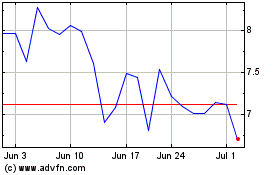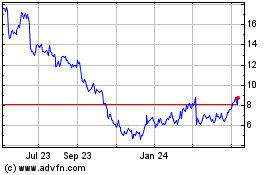Preclinical Data Presentations at Keystone Symposia Highlight Broad Immunotherapy Potential of Peregrine Pharmaceuticals' PS-...
March 13 2014 - 8:00AM
Marketwired
Preclinical Data Presentations at Keystone Symposia Highlight Broad
Immunotherapy Potential of Peregrine Pharmaceuticals' PS-Targeting
Antibodies
Oral Plenary Presentation Details Ability of PS-Targeting
Antibodies to Reactivate Tumor Immunity at Multiple Levels and
Enhance the Anti-Tumor Effects of Anti-PD-1 Antibodies; Data
Presented Supports PS-Binding Antibody's Ability to Inhibit HIV
Infection In Vitro; Recent Data Supports the PS Mediated
Immunosuppression in Aiding Infectious Disease Progression Opening
the Potential of PS Targeting Immune Checkpoint Therapeutic
Combinations
TUSTIN, CA--(Marketwired - Mar 13, 2014) - Peregrine
Pharmaceuticals, Inc. (NASDAQ: PPHM) (NASDAQ: PPHMP) today
announced that preclinical data presented at two Keystone Symposia
support the immune-stimulatory mechanism of action and therapeutic
potential of the company's phosphatidylserine (PS)-targeting
antibodies in both oncology and antiviral therapeutic areas. These
data were detailed in presentations at the Keystone Immune
Evolution in Cancer symposium in Whistler, British Columbia, Canada
and the Keystone HIV Pathogenesis - Virus vs. Host symposium in
Banff, Alberta, Canada. Peregrine's lead PS-targeting antibody,
bavituximab, is currently being evaluated in second-line non-small
cell lung cancer (NSCLC) as part of the SUNRISE pivotal Phase III
clinical trial.
In a poster titled, "Phosphatidylserine-Targeting Antibody
Triggers β-Chemokine Release from Monocytes by Cell-Cell
Crosslinking and is a Potent Inhibitor of HIV-1 In Vitro", Cyril
Empig, Ph.D., associate director of preclinical research in
infectious disease at Peregrine, presented data from studies
conducted by Duke University and Peregrine researchers that further
characterizes the mechanism by which the PS-binding antibody PGN632
inhibits the HIV infection of cells. Results revealed that PGN632
stimulates immune cells to link together and secrete molecules that
block viral receptors used by HIV to infect cells. Furthermore, the
immune-stimulatory mechanism of PS-targeting antibodies was further
validated as study results showed that the antiviral mechanism of
action was dependent on using the full length antibody rather than
an antibody fragment that simply blocks PS.
"The immunosuppressive effects of phosphatidylserine, or PS,
during routine cell death and the way in which tumors and
infectious diseases exploit high levels of PS to evade immune
surveillance are now very well-established through an abundance of
peer-reviewed scientific publications from researchers worldwide,"
said Cyril Empig, Ph.D., associate director of preclinical research
in infectious disease at Peregrine. "PGN632 appears to have an
antiviral mechanism of action that is quite potent at inhibiting
HIV in vitro and we look forward to further collaborative studies
using PGN632 and in combination with other immune enhancing agents
to evaluate their potential therapeutic effects in vivo."
In an oral presentation titled, "Phosphatidylserine-Targeting
Antibodies Induce M1 Macrophage Polarization, Promote Myeloid
Derived Suppressor Cell Differentiation and Boost Tumor-Specific
Immunity" Xianming Huang, Ph.D., of The University of Texas
Southwestern Medical Center in Dallas, presented data from studies
demonstrating that PS-targeting antibodies override PS-mediated
immune suppression in tumors and induce multiple downstream
immune-stimulatory effects. Results showed a reduction of highly
immunosuppressive myeloid derived suppressor cells (MDSC),
increases in inflammatory cytokines, tumor-fighting M1 macrophages,
mature dendritic cells and tumor-specific cytotoxic T-cells.
Additionally, combination therapy studies utilizing a PS-targeting
antibody with an anti-PD-1 antibody yielded enhanced therapeutic
results in a preclinical model of melanoma, including delays and
reductions in tumor growth compared to either antibody administered
alone.
"Data presented at Keystone this week also point to increasing
recognition of PS as playing an immunosuppressive role during the
chronic phase of infectious disease. The supportive data presented
this week will allow us to further insert PS into the immunotherapy
discussion and we look forward to the possibility for future
potential collaborative studies in both oncology and infectious
diseases," said Jeff T. Hutchins, Ph.D., vice president of
preclinical research at Peregrine. "We are pleased that PS and the
PS receptor pathway have attracted an increasing amount of
attention among cancer immunotherapy researchers and that PS is now
seen as both an upstream immune checkpoint and novel drug target in
this promising new area of cancer treatment."
Copies of these posters are located in the Upcoming Events
section of the Investors tab of Peregrine's website
www.peregrineinc.com.
About Bavituximab: A Targeted Immunotherapy Bavituximab is a
first-in-class phosphatidylserine (PS)-targeting monoclonal
antibody that represents a new approach to treating cancer. PS is a
highly immunosuppressive molecule usually located inside the
membrane of healthy cells, but "flips" and becomes exposed on the
outside of cells that line tumor blood vessels, creating a specific
target for anti-cancer treatments. PS-targeting antibodies target
and bind to PS and block this immunosuppressive signal, thereby
enabling the immune system to recognize and fight the tumor. These
data detailing the immune-stimulatory mechanism of action of
PS-targeting antibodies, such as the company's lead drug candidate
bavituximab, are the subject of a manuscript published in the
October 2013 issue of the American Association for Cancer Research
(AACR) peer-reviewed journal, Cancer Immunology Research.
Bavituximab is currently being evaluated in several solid tumor
indications, including non-small cell lung cancer, breast cancer,
liver cancer and rectal cancer with a trial in advanced melanoma
anticipated to initiate in the near future.
About Keystone Symposia Keystone Symposia serve as a catalyst
for the advancement of biomedical and life sciences by connecting
scientists within and across disciplines at conferences and
workshops held at venues that create an environment conducive to
information exchange, generation of new ideas and acceleration of
applications that benefit society.
About Peregrine Pharmaceuticals, Inc. Peregrine Pharmaceuticals,
Inc. is a biopharmaceutical company with a pipeline of novel drug
candidates in clinical trials for the treatment and diagnosis of
cancer. The company is developing multiple clinical programs in
cancer with its lead immunotherapy candidate bavituximab while
seeking a partner to further advance its novel brain cancer agent
Cotara®. Peregrine also has in-house cGMP manufacturing
capabilities through its wholly-owned subsidiary Avid Bioservices,
Inc. (www.avidbio.com), which provides development and
biomanufacturing services for both Peregrine and third-party
customers. Additional information about Peregrine can be found at
www.peregrineinc.com.
Safe Harbor Statement: Statements in this press release which
are not purely historical, including statements regarding Peregrine
Pharmaceuticals' intentions, hopes, beliefs, expectations,
representations, projections, plans or predictions of the future
are forward-looking statements within the meaning of the Private
Securities Litigation Reform Act of 1995. The forward-looking
statements involve risks and uncertainties including, but not
limited to, the risk that the results from human clinical studies
involving combinations of bavituximab with an anti-CTLA-4 or an
anti-PD-1 antibody may not correlate with the data from the
preclinical studies. It is important to note that the Company's
actual results could differ materially from those in any such
forward-looking statements. Factors that could cause actual results
to differ materially include, but are not limited to, uncertainties
associated with completing preclinical and clinical trials for our
technologies; the early stage of product development; the
significant costs to develop our products as all of our products
are currently in development, preclinical studies or clinical
trials; obtaining additional financing to support our operations
and the development of our products; obtaining regulatory approval
for our technologies; anticipated timing of regulatory filings and
the potential success in gaining regulatory approval and complying
with governmental regulations applicable to our business. Our
business could be affected by a number of other factors, including
the risk factors listed from time to time in our reports filed with
the SEC including, but not limited to, our annual report on Form
10-K for the fiscal year ended April 30, 2013 as well as any
updates to these risk factors filed from time to time in the
company's other filings with the Securities and Exchange
Commission. The Company cautions investors not to place undue
reliance on the forward-looking statements contained in this press
release. Peregrine Pharmaceuticals, Inc. disclaims any obligation,
and does not undertake to update or revise any forward-looking
statements in this press release.
Contact: Christopher Keenan or Jay Carlson Peregrine
Pharmaceuticals (800) 987-8256 info@peregrineinc.com
Avid Bioservices (NASDAQ:CDMO)
Historical Stock Chart
From Mar 2024 to Apr 2024

Avid Bioservices (NASDAQ:CDMO)
Historical Stock Chart
From Apr 2023 to Apr 2024
